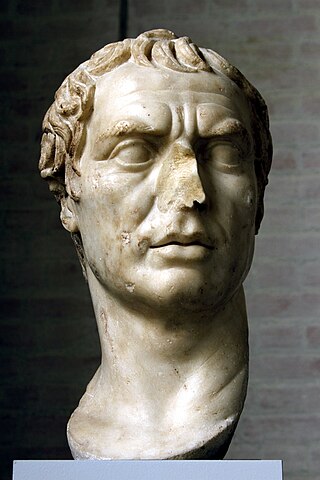Gnaeus Cornelius Scipio Calvus was a Roman general and statesman during the third century BC. He played a major part in the Second Punic War establishing Roman Rule in the east of the Iberian Peninsula and tying up several Carthaginian armies keeping them from reinforcing Hannibal.

Lucius Cornelius Scipio Asiaticus was a general and statesman of the Roman Republic. He was the son of Publius Cornelius Scipio and the younger brother of Scipio Africanus. He was elected consul in 190 BC, and later that year led the Roman forces to victory at the Battle of Magnesia.

Lucius Aemilius Paullus Macedonicus was a two-time consul of the Roman Republic and general, who conquered Macedon in the Third Macedonian War.

Saturnian meter or verse is an old Latin and Italic poetic form, of which the principles of versification have become obscure. Only 132 complete uncontroversial verses survive. 95 literary verses and partial fragments have been preserved as quotations in later grammatical writings, as well as 37 verses in funerary or dedicatory inscriptions. The majority of literary Saturnians come from the Odysseia, a translation/paraphrase of Homer's Odyssey by Livius Andronicus, and the Bellum Poenicum, an epic on the First Punic War by Gnaeus Naevius.

Lucius Cornelius Scipio Barbatus was one of the two elected Roman consuls in 298 BC. He led the Roman army to victory against the Etruscans near Volterra. A member of the noble Roman family of Scipiones, he was the father of Lucius Cornelius Scipio and Gnaeus Cornelius Scipio Asina and great-grandfather of Scipio Africanus.
Lucius Cornelius Scipio may refer to:
Gnaeus Cornelius Scipio Asina was a Roman general and statesman who fought in the First Punic War.
Lucius Cornelius Lentulus was a consul of the Roman Republic in 199 BC with Publius Villius Tappulus as his colleague.

The gens Cornelia was one of the greatest patrician houses at ancient Rome. For more than seven hundred years, from the early decades of the Republic to the third century AD, the Cornelii produced more eminent statesmen and generals than any other gens. At least seventy-five consuls under the Republic were members of this family, beginning with Servius Cornelius Maluginensis in 485 BC. Together with the Aemilii, Claudii, Fabii, Manlii, and Valerii, the Cornelii were almost certainly numbered among the gentes maiores, the most important and powerful families of Rome, who for centuries dominated the Republican magistracies. All of the major branches of the Cornelian gens were patrician, but there were also plebeian Cornelii, at least some of whom were descended from freedmen.
Publius Aelius Paetus was a Roman consul of the late 3rd century BC. He was a prominent supporter of Scipio Africanus, and was elected censor with Africanus in 199.
Lucius Cornelius Scipio was a statesman of the Roman Republic. He was the second son of Scipio Africanus, but despite this illustrious background, his career was cut short by his demotion from the senate by the censors in 174 BC.

The sarcophagus of Lucius Cornelius Scipio Barbatus, consul in 298 B.C., is a solid tuff burial coffin, once located in the Tomb of the Scipios. It is now found in the Vestibolo Quadrato of the Pio-Clementine Museum in the Vatican Museum complex.
Gaius Laelius Sapiens, was a Roman statesman, best known for his friendship with the Roman general and statesman Scipio Aemilianus. He was consul of 140 BC, elected with the help of his friend, by then censor, after failing to be elected in 141 BC. Gaius Laelius Sapiens was the son and heir of the Punic War general Gaius Laelius, himself consul in 190 BC. This Laelius had been former second-in-command and long-time friend, since childhood, of the Roman general and statesman Scipio Africanus. The younger Laelius was apparently born around 188 BC, after his father had become consul but had failed to win command of the campaign against Antiochus III the Great of Syria, which would have made him a rich man. His mother's name is unknown.
Gaius Caecilius Metellus Caprarius was a consul of the Roman Republic in 113 BC with Gnaeus Papirius Carbo. He served under Scipio Aemilianus in Numantia around 133 BC. He was praetor in 117 BC. His proconsulship in Thrace in 112–111 BC earned him a triumph. He was censor in 102 BC with his cousin, Quintus Caecilius Metellus Numidicus.

The Tomb of the Scipios, also called the hypogaeum Scipionum, was the common tomb of the patrician Scipio family during the Roman Republic for interments between the early 3rd century BC and the early 1st century AD. Then it was abandoned and within a few hundred years its location was lost.

Publius Cornelius Scipio Africanus was a Roman general and statesman, most notable as one of the main architects of Rome's victory against Carthage in the Second Punic War. Often regarded as one of the greatest military commanders and strategists of all time, his greatest military achievement was the defeat of Hannibal at the Battle of Zama in 202 BC. This victory in Africa earned him the honorific epithet Africanus, literally meaning "the African," but meant to be understood as a conqueror of Africa.
An elogium was an inscription in honour of a deceased person, which was placed on tombs, ancestral images and statues during the Roman age. The elogia are sometimes synonyms with the tituli, the identifying inscriptions on wax images of deceased ancestors that were displayed in the atrium of the domus of noble families, but they are shorter than the laudatio funebris, the funeral oration. Originally, the text was usually written in saturnians, but later it could be in hexameters, iambic hexameters, distichs or in prose. Characteristic of the elogium is the nominative case used for the name of the deceased and not, as it was the case later in the funerary literature, the dative.







